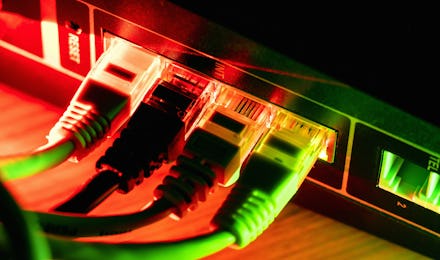Why your internet might get faster because of coronavirus

As Americans hunker down, trying their best to stay a few feet away from each other in public and dealing with all the issues social distancing brings, they are becoming more reliant than ever on digital connections. Schools are switching to online classes, countless businesses are telling employees to work from home, and people are swapping drinks at the bar for streaming movies at home. That’s a lot of data. In response, some internet service providers (ISP) have dropped restrictions on home internet connections. That includes ditching data caps, increasing connection speeds, and improving overall access to service.
According to a report from VICE, AT&T became the first major ISP to set aside its data cap in light of the demand created by the coronavirus. AT&T offers several different tiers of its home internet service, three of which come with data caps. The soft limits cap users at 150GB, 250GB, or 1TB of data. Users who exceed those limits are charged $10 for each additional 50GB of data used.
AT&T confirmed to Mic that it will be eliminating the data cap for its home internet service. "Many of our AT&T Internet customers already have unlimited home internet access, and we are waiving internet data overage for the remaining customers,” a company spokesperson said.
For the time being, AT&T appears to be the only major ISP that will remove its data caps as a result of the virus. Comcast, the largest internet provider in the United States, continues for the time being to enforce a data cap of 1TB on most households, charging $10 for each additional 50GB block of data used or an additional $50 per month to access unlimited data. The company told Mic it will "continue to look at other ways we might be able to help during this difficult time." Cox Communications did not comment on plans to get rid of its data cap, which currently caps all internet subscribers at 1TB of data per month. Mediacom did not respond to requests for comment. Charter and Verizon do not enforce data caps on home internet service.
These types of caps are often defended by ISPs as a tool for managing the network and necessary for ensuring that services don't succumb to congestion during high-usage hours. However, the real reason these companies enforce these artificial limits is likely much simpler: to make more money off of consumers. In a 2014 report published by the US Government Accountability Office (GAO), the agency noted that "wireline ISPs said that congestion is not currently a problem" for their networks. The GAO found that these caps were instead found to "generate more revenues for ISPs to help fund network capacity upgrades as data use grows." A leaked memo from Comcast revealed that the company admitted that data caps are not about network congestion, and Comcast's own vice president of internet services said on Twitter that data caps are "business policies," and not an engineering solution.
While some providers are still committed to enforcing unnecessary data caps, they are loosening other restrictions on service. Charter told Mic that it will be offering "free Spectrum broadband and Wi-Fi access for 60 days to households with K-12 and/or college students "who do not already have a Spectrum broadband subscription. The company will offer any level of service up to 100 Mbps data speeds. It will also offer free public access to its more than 500,000 public Wi-Fi hotspots across the country, which typically require a Charter username and password to access.
While Comcast is not removing its data caps, the company announced that it will focus on "increasing access and speeds" for its Internet Essentials plan, a service made available to low-income households. Comcast will be increasing internet speeds for Internet Essentials subscribers to 25 Mbps for downloads and 3 Mpbs for uploads — the base level that any internet service must meet in order to be considered a broadband connection.
Cox Communications announced earlier this week that it will pledge not to terminate service of any resident or small business customer who fails to pay their bill "due to disruptions caused by the coronavirus pandemic." The company will also waive late fees because of "economic circumstances related to the coronavirus pandemic" and will open up its public Wi-Fi hotspots to the public for at least the next 60 days. On Friday, the company announced plans to increase access and speeds to its Connect2Compete service (much like Comcast's Internet Essentials, Connect2Compete is available to low-income households). It will also boost download speeds for all customers from 25 Mbps to 50 Mbps for 60 days. The company said that change will go into effect on March 17.
While home internet service is opening things up a bit during a time of crisis, mobile carriers appear to remain as restrictive as ever. Most carriers offer some form of an "unlimited" data plan, but in all cases, the plan is not truly unlimited. It is typically capped somewhere just north of 20GB per month, at which point users have their speeds throttled or slowed. A spokesperson for AT&T, which has capped and "unlimited" data plans, told Mic that they "don’t yet have an update as it relates to mobile." A spokesperson for Verizon said, "Most of the company’s wireless customers are on unlimited wireless plans." Sprint and T-Mobile did not respond to requests for details regarding plans to lift limits on capped and unlimited mobile data plans.
These changes are relatively small ones for internet providers, but could be essential ones for consumers who suddenly find their livelihood, education, and entertainment entirely reliant on a good internet connection. The removal of data caps and increases in data speeds are positive developments, but makes it all the more apparent how unnecessary the restrictions are in the fist place.